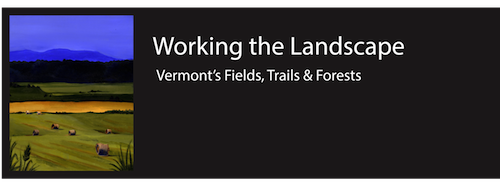WL Survey Results
Vermont's Working Landscape Survey, 2014
In December 2013 food and forest entrepreneurs, conservation professionals, planners, researchers, and policy leaders gathered at Vermont Technical College in Randolph, VT for the Summit on the Future of Vermont’s Working Landscape. We sent an online survey to conference attendees in March 2014 asking what they value about Vermont, what the working landscape means to them, and what challenges face Vermont's working landscapes.
Most of the survey respondents work in the fields of advocacy, planning, government, conservation, and business. Of the 153 people who responded, many cited environmental quality, landscape aesthetics, and the ability to make a living off the land as the most important elements of the landscape. Participants believed that land use planning, climate change, and markets hold the greatest potential to shape Vermont's future working landscapes.
Summary of Respondents
Responses: 153 responses out of 377 email invitations sent (40.6% response rate)
Gender: 85 (55.6%) men; 62 (40.5%) women; 1 (.7%) trans/other
Age: Mean is 52, Median is 55, Mode is 58.
Average % of lifetime spent in Vermont: 55.19%; 22/153 are lifelong Vermonters (14.4%).
Summary of Responses
How do you participate in the working landscape?
- 50.3% recreation
- 44.4% food production for home consumption
- 40.0% conservation
- 34.0% policy
- 37.3% advocacy
- 32.0% education
- 28.8% other
- 22.2% hunt, fish, forage
- 20.9% agricultural production
What does the working landscape mean to you?
“...a resource, an asset, a chance to turn around the exploitations of the past to provide long term land based assets for the future”
“…a landscape of forests and farms that provides income and employment to Vermonters.”
“A landscape where economics, community, and nature meet in a balanced, thus sustainable way. Working the land as farms and forests in an economically and environmentally sound manner so that families and communities can be sustained by that activity in the long run. Otherwise we will end up looking like New Jersey.”
What do you value about Vermont?
Common themes:
- community
- sense of place
- identity
- people
- beauty/aesthetics
- quality of life
- scale
- connection to the land
- strong work ethic
- working landscape
- rural values
- recreational opportunities
- accessibility of government
- innovation/entrepreneurial spirit
"The land itself is part of a Vermonter's identity... many of us grew-up working on farms or in the forest... it was part of the generations that came before us and it is part of us... unfortunately the loss of family farms means that the next generation will not have that connection to the land"
“I love the landscape and the sense of community/belonging. I have never found this anywhere else.”
"Everything. This is an amazing place. But it starts with the people.”
What are the biggest challenges facing the working landscape?
Common responses:
- Affordability of food and land
- Climate change/severe weather
- Government regulation
- Development, fragmentation, and parceling
“Some of the biggest challenges I see facing Vermont is [sic] the decline of the dairy industry and more and more dairy farms selling out, with not enough resources available to keep them in farmland. I think gentrification and subdivision of farm and forest land for development are major threats to the working landscape, unless resources go into preserving these spaces.”
“Two-tiered economy: some people work all the time and have little, others buy 27 dollar a pound cheese; have not solved the food situation with novelty for people of means, while others can only afford Chez Whiz.”
